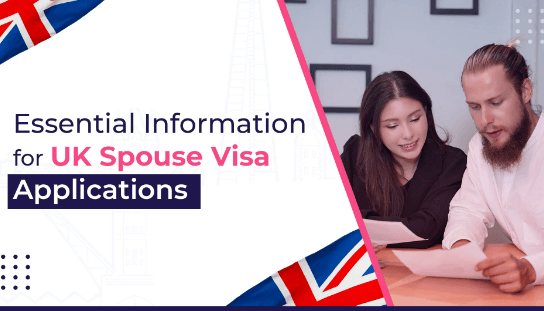For individuals studying, working, or living abroad, the ability to be reunited with family is paramount. Dependent visas serve this exact purpose, allowing spouses, partners, and children to join their loved ones. This guide provides a clear overview of the process, requirements, and rights associated with dependent visas for the United States, Canada, and the United Kingdom.
1. Understanding Dependent Visas & Core Eligibility
A dependent visa is a immigration status granted to the immediate family members of a primary visa holder, enabling them to live in the host country. The core principle across all three countries is proving a genuine relationship.
Who Qualifies as a Dependent?
-
Spouse: Legally married partner.
-
Common-Law Partner: A partner in a committed, marriage-like relationship with proof of cohabitation (recognized in Canada and the UK).
-
Child: Typically, unmarried children under the age of 21 (or 18 in the UK, with some exceptions).
Universal Requirements:
-
Valid passports for all applicants.
-
Proof of the primary applicant’s legal status (visa, permit).
-
Proof of genuine relationship (marriage certificate, birth certificate, photos, joint financial documents).
-
Meeting health and character requirements.
-
Demonstrating sufficient financial resources to support the family without public funds.
2. Dependent Visas in the United States
U.S. dependent visas are directly tied to the primary visa category.
Application Process (USA):
-
The primary visa holder must have their status approved.
-
Complete the Online Nonimmigrant Visa Application (DS-160).
-
Pay the application fee.
-
Schedule and attend a visa interview at a U.S. Embassy or Consulate.
-
Provide biometrics if required.
3. Dependent Visas in Canada
Canada offers pathways for both temporary and permanent residents to bring their families.
For Temporary Residents (Work/Study Permit Holders):
-
Spousal Open Work Permit (SOWP): Allows the spouse/common-law partner of a skilled worker or international student to work for any employer in Canada.
-
Study Permit for Children: Minor children can attend school, often without needing their own study permit if accompanying a parent with a work/study permit.
For Permanent Residents & Citizens:
-
The Family Class Sponsorship program is a permanent immigration pathway for spouses, partners, and dependent children. This is a more complex process with higher financial eligibility requirements.
Application Process (Canada – Temporary):
Applications are typically submitted online through the Immigration, Refugees and Citizenship Canada (IRCC) portal. Biometrics are almost always required.
4. Dependent Visas in the United Kingdom
The UK’s dependent visa rules are stringent, with a major focus on financial requirements.
Key Visa Types:
-
Skilled Worker Dependent Visa: For families of those on a Skilled Worker Visa.
-
Student Dependent Visa: Available for the dependents of postgraduate students on courses lasting 9 months or longer.
Key Requirements for UK Dependents:
-
Financial Requirement: You must prove you have adequate funds to support your dependents. The amount is in addition to the funds the main applicant must show for themselves.
-
Relationship Proof: Robust evidence of a genuine relationship is critical.
-
Immigration Health Surcharge (IHS): Dependents must pay the IHS to access the UK’s National Health Service (NHS).
Rights: Dependent visa holders in the UK can generally work (except as a doctor or dentist in training), study, and live in the UK.
Application Process (UK):
Applications are made online via the UK Government website (GOV.UK). Applicants usually need to provide biometrics at a visa application center.
5. Essential Documents Checklist
Gather these core documents for any application:
-
Proof of Relationship: Marriage certificate, birth certificates, photographs, correspondence history, joint bank accounts/leases.
-
Primary Applicant’s Documents: Copy of passport, bio-data page, and valid visa/residence permit.
-
Financial Evidence: Bank statements, employment letters, scholarship letters proving sufficient funds.
-
Passports: Valid passports for all dependents.
-
Completed Application Forms: Specific to the country and visa type.
-
Passport-Sized Photographs: Meeting specific country guidelines.
6. Processing Times & Fees (Approximate)
Note: Fees and processing times are subject to frequent change. Always check official government websites for the most current information.
Key Considerations for Dependent Visa Holders
-
Work Rights: Never assume the right to work. This privilege is specific to the visa category and country (e.g., L-2 and J-2 in the US, SOWP in Canada, most dependents in the UK).
-
Study Rights: Generally, dependents can enroll in study programs. However, in the US, F-2 holders cannot enroll in full-time degree programs.
-
Visa Validity: The dependent visa is typically tied to the validity of the primary applicant’s visa. If the primary visa expires or is revoked, the dependent status is also affected.
-
Path to Permanent Residency: In many cases (especially in Canada and via certain US visas like L-1/H-1B), dependents can often be included in applications for permanent residency.
Conclusion
Navigating the dependent visa process requires careful attention to the specific rules of the host country. By thoroughly understanding the eligibility requirements, preparing a strong application with extensive documentation, and planning for processing times and fees, families can successfully navigate the immigration system and enjoy their time abroad together. Always consult the official government immigration websites for the most accurate and up-to-date information before applying.


Comments are closed.